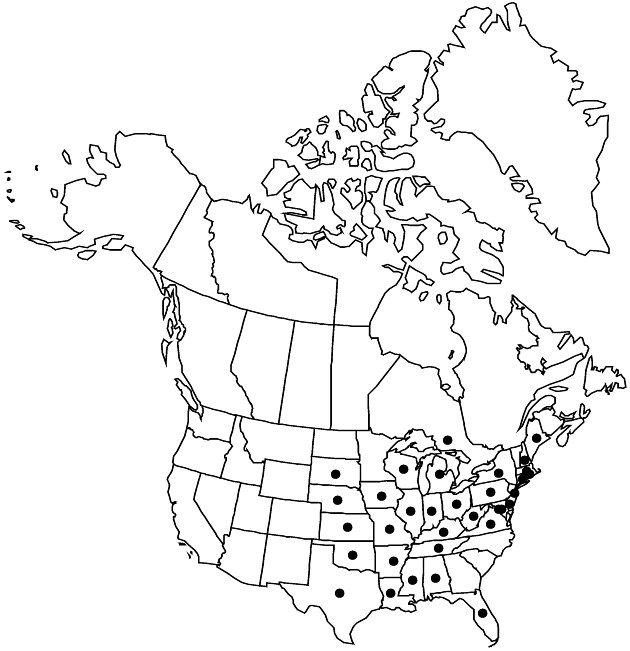Symphyotrichum praealtum
Phytologia 77: 289. 1995.
Perennials (10–)50–150(–200) cm, colonial; fleshy long-rhizomatous. Stems 1, erect to ascending (stout, ± glaucous or reddish), glabrate to moderately hispidulous-hirsute (mostly in lines) distally. Leaves thick, firm, margins often revolute, scabrous, apices mucronate, abaxial faces glabrous, vein areoles conspicuous, ± isodiametric, adaxial waxy, glabrate to strigose, ± scabrous (distal cauline with axillary leaf clusters, sometimes becoming branches); basal withering by flowering, petiolate to subpetiolate (petioles winged, bases sheathing, ciliate), blades spatulate, 40–70 × 10–25 mm, bases attenuate, margins entire to shallowly serrate, apices rounded to obtuse; proximal cauline withering by flowering, sessile (subpetiolate), blades elliptic or lanceolate to oblanceolate or linear-lanceolate, 40–100(–150) × 3–18 mm, progressively reduced distally, bases cuneate, often slightly rounded, apices acute to attenuate, callus-pointed, abaxial faces scabrellous, adaxial glabrous or ± puberulent; distal sessile, blades ovate or elliptic-lanceolate to lanceolate or linear, 10–85 × 2–17 mm, progressively reduced distally, bases cuneate, margins entire, apices acute or obtuse, callus-pointed. Heads in ample, foliaceous, usually dense, paniculiform arrays, branches ascending to spreading, ± racemiform. Peduncles 0.3–2 cm, ± pilose, bracts 5–12+, ascending or recurved-spreading, lance-elliptic to lanceolate or linear-lanceolate, foliaceous, distal closely subtending heads, not grading into phyllaries. Involucres campanulate, (4–)5–7(–8) mm. Phyllaries in 4–6 series, appressed, oblong-lanceolate to linear (innermost) (outer sometimes ± foliaceous), unequal, bases indurate 1/2–3/4, margins scarious, erose, hyaline, sparsely ciliolate (often ciliate basally), green zones lanceolate to lance-rhombic, apices sometimes spreading, acute to acuminate, mucronate, often reddish purple apically, faces glabrous. Ray florets (6–)20–35; corollas pale blue-violet to lavender or rose-purple, rarely white, laminae 5–10(–12) × 1–1.7 mm. Disc florets 20–30(–35+); corollas cream or light yellow turning pinkish purple, 4–6.5 mm, tubes shorter than narrowly funnelform throats, lobes lanceolate, 0.5–1.3 mm. Cypselae purple or stramineous with purple, obovoid, sometimes ± compressed, 1.5–2 mm, 4–5-nerved, faces thinly strigillose; pappi white, 4–6.5 mm. 2n = 32, 48, 64.
Phenology: Flowering Aug–Oct.
Habitat: Wet, loamy soils, wet prairies or meadows, lake and stream shores, oak savannas, open woods or thickets, fields, moist banks, ditches, roadsides, recent clearings
Elevation: 0–400+ m
Distribution

Ont., Ala., Ark., Conn., Del., D.C., Fla., Ill., Ind., Iowa, Kans., Ky., La., Maine, Md., Mass., Mich., Miss., Mo., Nebr., N.H., N.J., N.Y., Ohio, Okla., Pa., R.I., S.Dak., Tenn., Tex., Va., W.Va., Wis., Mexico (Chihuahua, Coahuila, Nuevo Léon), introduced in Europe.
Discussion
Symphyotrichum praealtum was reported by H. R. Hinds (2000) as a possible introduced, non-persisting ephemeral in New Brunswick. The species is introduced in central Europe, where it has been confused with S. lanceolatum (J. C. Semple et al. 2002). A. G. Jones (1989) reported hybridization with S. lanceolatum and S. firmum.
G. L. Nesom (1994b, 1997) and J. C. Semple et al. (2002) recognize several varieties within the species: var. praealtum [syn. Aster coerulescens de Candolle, A. praealtus var. coerulescens (de Candolle) A. G. Jones, A. praealtus var. imbricatior Wiegand] (2n = 32); var. angustior (Wiegand) G. L. Nesom (syn. A. praealtus var. angustior Wiegand) (2n = 64); var. nebraskense (Britton) G. L. Nesom (syn. A. praealtus var. nebraskensis Britton); var. subasperum (Lindley) G. L. Nesom [syn. A. praealtus var. subasper (Lindley) Wiegand, A. subasper Lindley]; and var. texicola (Wiegand) G. L. Nesom (syn. A. praealtus var. texicola Wiegand). Some of these varieties deserve recognition, but the validity of others needs confirmation.
Selected References
None.